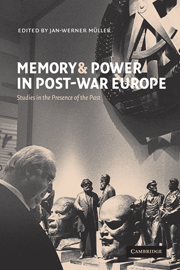Book contents
- Frontmatter
- Contents
- List of contributors
- Acknowledgements
- Introduction: the power of memory, the memory of power and the power over memory
- Part 1 Myth, memory and analogy in foreign policy
- 1 Memory of sovereignty and sovereignty over memory: Poland, Lithuania and Ukraine, 1939–1999
- 2 Myth, memory and policy in France since 1945
- 3 The power of memory and memories of power: the cultural parameters of German foreign policy-making since 1945
- 4 The past in the present: British imperial memories and the European question
- 5 Europe's post-Cold War remembrance of Russia: cui bono?
- 6 Memory, the media and NATO: information intervention in Bosnia-Hercegovina
- Part 2 Memory and power in domestic affairs
- Index
2 - Myth, memory and policy in France since 1945
Published online by Cambridge University Press: 22 September 2009
- Frontmatter
- Contents
- List of contributors
- Acknowledgements
- Introduction: the power of memory, the memory of power and the power over memory
- Part 1 Myth, memory and analogy in foreign policy
- 1 Memory of sovereignty and sovereignty over memory: Poland, Lithuania and Ukraine, 1939–1999
- 2 Myth, memory and policy in France since 1945
- 3 The power of memory and memories of power: the cultural parameters of German foreign policy-making since 1945
- 4 The past in the present: British imperial memories and the European question
- 5 Europe's post-Cold War remembrance of Russia: cui bono?
- 6 Memory, the media and NATO: information intervention in Bosnia-Hercegovina
- Part 2 Memory and power in domestic affairs
- Index
Summary
In this chapter I hope to show that memory is a key factor in shaping decisions taken in the pursuit of power, but that conversely policy goals have a decisive influence on how memory is constructed. Two different forms of memory should be distinguished for our purposes. First, there are the multitudinous and fragmented memories that individuals may have of events such as the German occupation of France in 1940–5. Such an event may be variously experienced as trauma, loss, hunger, persecution, betrayal, deportation, new-found power or heroic resistance, depending on the individual, and these memories have no unmediated impact on policy-making. Second, there are the myths elaborated by politicians, intellectuals and the media to order and explain those events, and to overcome the pain associated with them. They are myths not in the sense of fictions or fairy-tales but of narratives of the past which serve to give an identity to a collectivity such as the nation, bind it together and legtimate policy decisions taken on its behalf. They constitute what other contributors to this volume refer to as national or collective memory.
Clearly, the main policy objective of a state is security. Among politicians, intellectuals and the media, however, there will be disagreements about the best policy to adopt in order to ensure that security. Some will propose an alliance with a given power, others wariness of it or even war with it.
- Type
- Chapter
- Information
- Memory and Power in Post-War EuropeStudies in the Presence of the Past, pp. 59 - 75Publisher: Cambridge University PressPrint publication year: 2002
- 8
- Cited by

